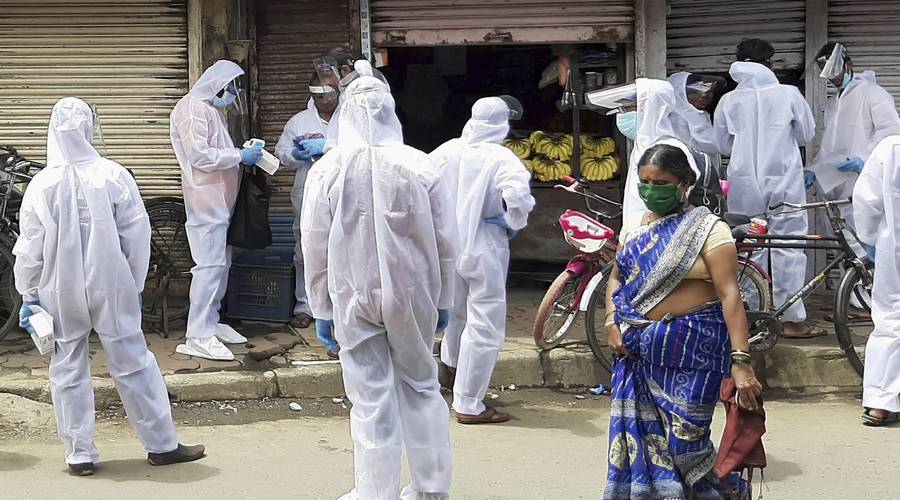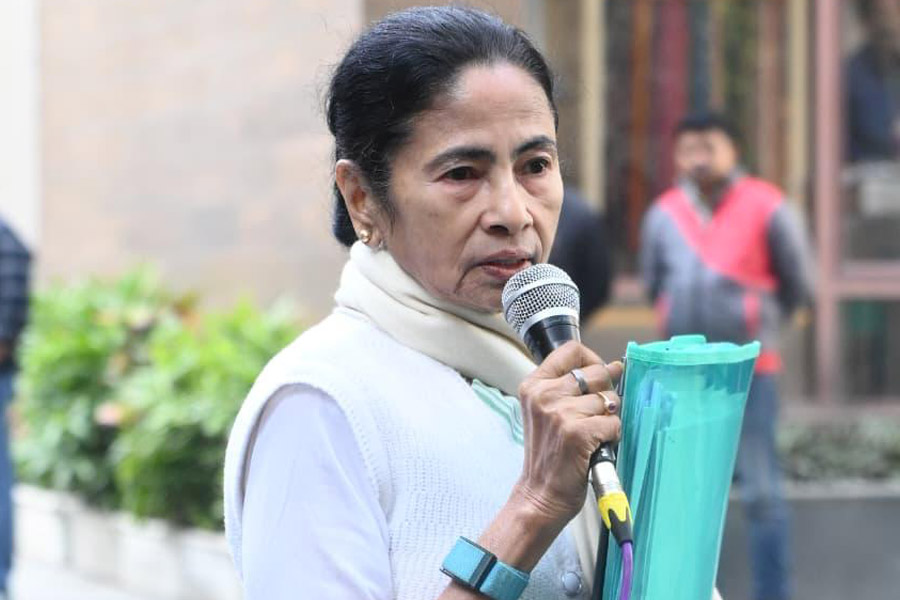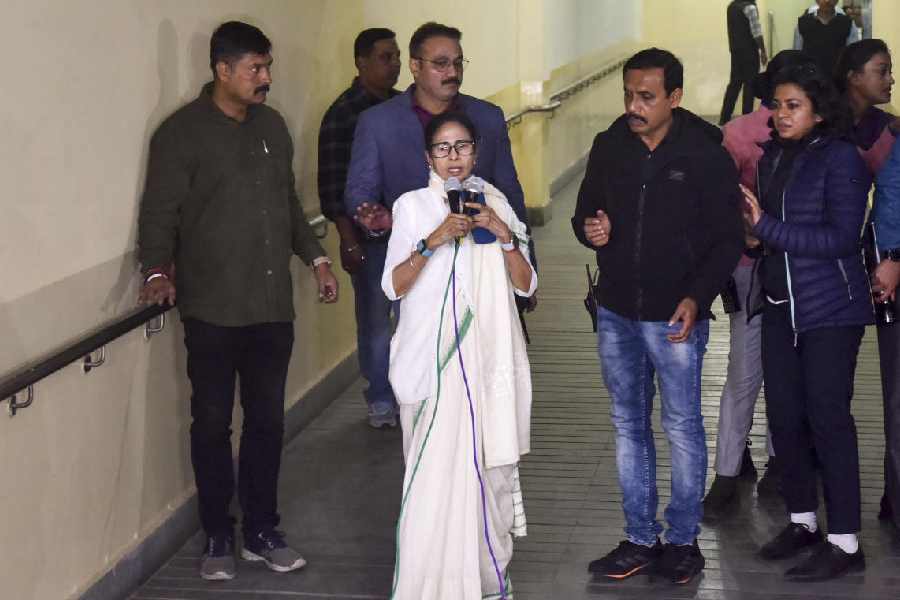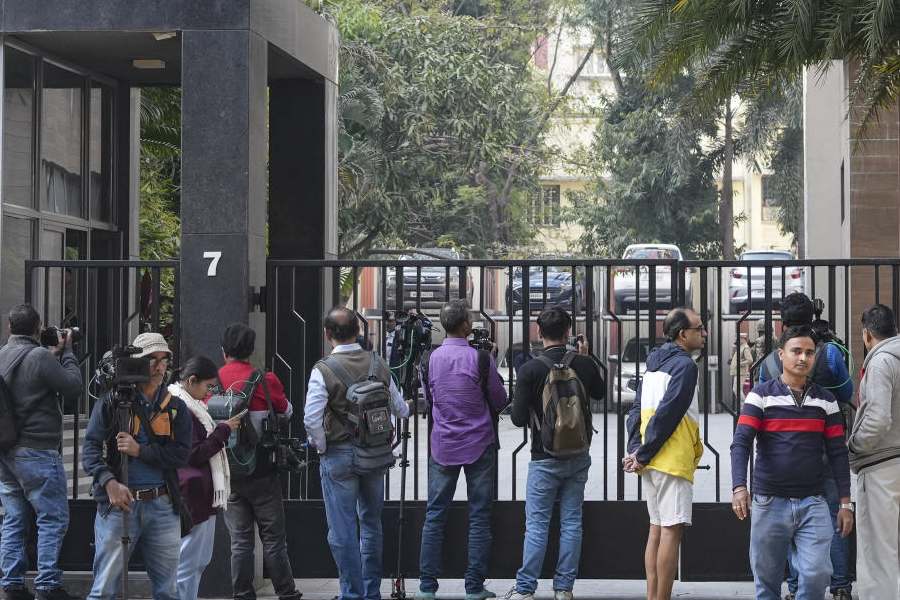India’s battle against Covid-19 is spinning out of control and the number of infections has jumped from 400,000 to over 548,318 in just eight days with almost 20,000 cases reported on Sunday.
Alarmingly, the death toll from the pandemic at 16,475 is also climbing sharply to new levels.
The stratospheric rise in the number of cases has led to a bizarre situation where some parts of the country are going into stringent lockdowns aimed at curbing the Covid-19 spread and others are opening for business after months of being shut.
The pandemic’s also reaching more far-flung states like Assam which went into a draconian lockdown from Sunday midnight in Guwahati and the surrounding Kamrup district in a bid to stamp out infections before they get out of hand.
Assam’s health minister Himanta Biswa Sarma warned that the shutdown would be intense and even groceries would not be on sale. “This time it will be very strict as no grocery shops will be allowed to open or supply vegetables, and other essentials will be permitted for the first seven days.” The Assam government’s reacting strongly because of its 762 cases since June 15, 677 had not travelled outside the state.
Assam’s borrowing a leaf from Tamil Nadu’s playbook where the state has put Chennai and three surrounding districts into an intense lockdown with heavy fines for even going on a morning walk. Despite the stringent measures around 3,940 new cases were reported in the state on Sunday and 1,992 cases in Chennai. But there are indications that the Chennai and surrounding districts lockdown may be too late because earlier 71 per cent of all cases were from this area but that fell to 65 per cent by Sunday. Still, officials indicated the current lockdown will be tougher than the earlier one because it’s seen as a last ditch-effort to squash the illness.
Doctors in Chennai say the city has hardly any beds left for the new cases that are coming in every 24 hours. Tamil Nadu is, however, ahead in another way because it has performed over 1 million tests since the pandemic began.
In high-tech Bengaluru, where cases doubled in five days to 3,419 from 1,556, the Karnataka state government is imposing a full lockdown every Sunday from July 5 while night curfew has been shifted to 8 pm from 9 pm. Bengaluru had fared well early on but now is seeing a sudden leap in cases.
India’s battle against Covid-19 is spinning out of control and the number of infections has jumped from 400,000 to over 548,318 in just eight days with almost 20,000 cases reported on Sunday.
Alarmingly, the death toll from the pandemic at 16,475 is also climbing sharply to new levels.
The stratospheric rise in the number of cases has led to a bizarre situation where some parts of the country are going into stringent lockdowns aimed at curbing the Covid-19 spread and others are opening for business after months of being shut.
The pandemic’s also reaching more far-flung states like Assam which went into a draconian lockdown from Sunday midnight in Guwahati and the surrounding Kamrup district in a bid to stamp out infections before they get out of hand.
Assam’s health minister Himanta Biswa Sarma warned that the shutdown would be intense and even groceries would not be on sale. “This time it will be very strict as no grocery shops will be allowed to open or supply vegetables, and other essentials will be permitted for the first seven days.” The Assam government’s reacting strongly because of its 762 cases since June 15, 677 had not travelled outside the state.
Assam’s borrowing a leaf from Tamil Nadu’s playbook where the state has put Chennai and three surrounding districts into an intense lockdown with heavy fines for even going on a morning walk. Despite the stringent measures around 3,940 new cases were reported in the state on Sunday and 1,992 cases in Chennai. But there are indications that the Chennai and surrounding districts lockdown may be too late because earlier 71 per cent of all cases were from this area but that fell to 65 per cent by Sunday. Still, officials indicated the current lockdown will be tougher than the earlier one because it’s seen as a last ditch-effort to squash the illness.
Doctors in Chennai say the city has hardly any beds left for the new cases that are coming in every 24 hours. Tamil Nadu is, however, ahead in another way because it has performed over 1 million tests since the pandemic began.
In high-tech Bengaluru, where cases doubled in five days to 3,419 from 1,556, the Karnataka state government is imposing a full lockdown every Sunday from July 5 while night curfew has been shifted to 8 pm from 9 pm. Bengaluru had fared well early on but now is seeing a sudden leap in cases.
Flights only after July 15
The civil aviation ministry has already bowed to the inevitable and announced that scheduled commercial flights will not be started till July 15 even though it had been hoping to get them off the ground by July 1.
Jharkhand and West Bengal have also re-imposed modified lockdowns in certain districts in a bid to contain the pandemic. Telangana is looking at a total 15-day lockdown in the Greater Hyderabad area.
Even Kerala which, at one time, had brought the number of daily cases down to single digits reported a record 195 cases on Friday and 118 cases on Sunday. On Friday, all but 15 of the cases were people returning to the state from abroad or other parts of India. The state has reported more than 100 new cases daily for the last nine days and now has 2,015 active patients. The government’s focus has now shifted to contact tracing efforts on the people who haven’t travelled outside the state but who have caught the infection recently.
Maharashtra, Delhi and Tamil Nadu are still leading the way, accounting for the largest number of cases. On Sunday, Maharashtra reported its highest-ever number of 5,493 new cases, pushing the total to 164,626. Delhi, meanwhile, had 2,889 fresh cases, which actually was down from a peak of 3,947 on June 23, with a total of more than 83,000 infections. Delhi chief minister Arvind Kejriwal announced Monday that the government’s starting a “Plasma Bank” to address a shortage of plasma for treating Covid patients. “I appeal to Covid-19 recovered patients to donate their plasma,” Kejriwal tweeted.
Gradual opening up of businesses
But even as the number of cases is shooting upwards and some states are imposing or lengthening lockdowns, the opening of the economy is also happening simultaneously. Malls in Gurgaon and Faridabad are set to open on July 1 even though the two districts combined have had the bulk of cases in Haryana.
However, it’s planned to have strict social distancing norms in place in the malls and all stores will have to keep hand sanitizers and thermal imaging. Restaurants will only be allowed 50 per cent seating. Many individual stores are locked in rent battles with the malls and say they’ve suffered so much financially that they won’t be in a position to open unless they get a new financial deal.
Similarly, in industrial areas like Manesar, a key hub for the auto industry, workers are trickling back to the Maruti Udyog and Honda Motors plants. Maruti produced 3,714 vehicles in May compared to zero in April.
Centre in dilemma
The dilemma before the Centre and the state governments is that cases began soaring the moment the lockdown was lifted slightly and inter-state and international travel was allowed.
Kerala, for instance, had brought down the number of cases to single digits but that picture changed the moment expatriates from the Gulf and other foreign countries, and also from other parts of India, began returning to the state.
More cases can be expected as opening-up moves forward. But authorities say the lockdowns around the country have already created huge economic distress with millions being thrown out of jobs and cannot continue forever. The travel and tourism industry in India alone is looking at up to 40 million job losses -- both direct and indirect -- and about $17 billion in revenue loss in the next one year, according to the World Travel and Tourism Council. India’s once-booming economy is already forecast to shrink by at least five per cent this year.











